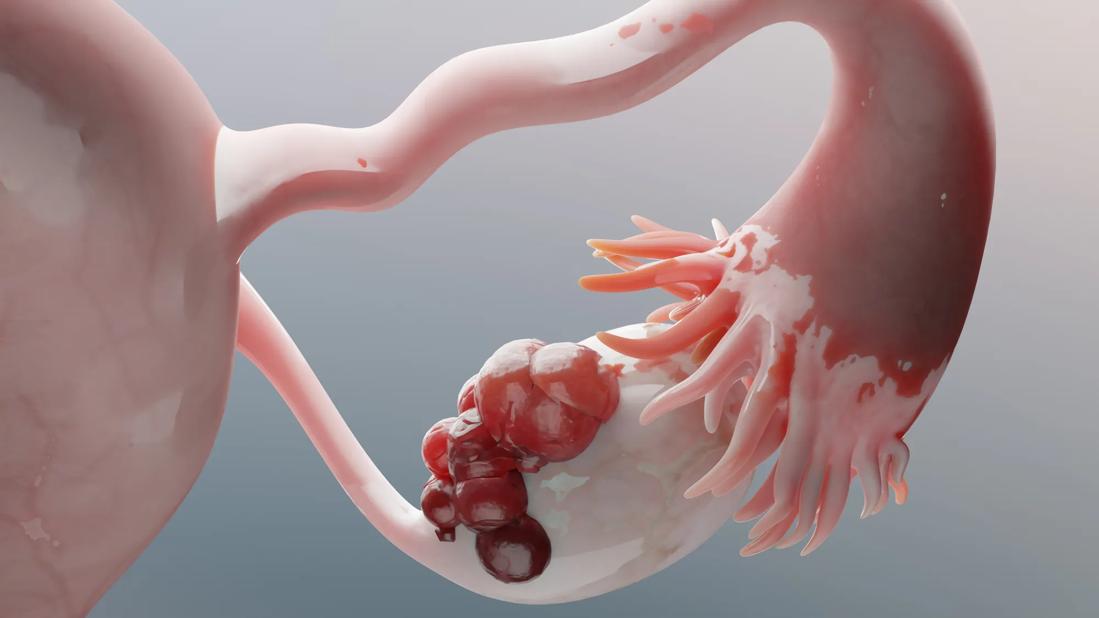Reassessing antibiotic dosage and type and restoring gut biome could improve survival rates

Antibiotics routinely used for ovarian cancer patients indiscriminately kill gut bacteria, leading to faster cancer progression and lower survival rates, according to a retrospective clinical analysis of patients conducted by Cleveland Clinic research.
Advertisement
Cleveland Clinic is a non-profit academic medical center. Advertising on our site helps support our mission. We do not endorse non-Cleveland Clinic products or services. Policy
The results, published in Cancer Research, challenge the standard of care for epithelial ovarian cancer (EOC), the leading cause of gynecologic cancer death. Although most ovarian cancer patients respond to chemotherapy, tumors recur in more than 80% of patients, leading to a survival rate of less than five years.
Antibiotics are crucial to treating bacterial infections during chemotherapy, but they kill bacteria that is essential for patients with ovarian cancer to respond to treatment. Selecting antibiotics or dosages proven to preserve more of the microbiome could preserve the balance of gut bacteria and prevent tumor progression or treatment resistance, says Ofer Reizes, PhD, Department of Cardiovascular & Metabolic Sciences at Cleveland Clinic and lead investigator on the study.
The research digs deeper into an earlier study of women with advanced EOC undergoing platinum chemotherapy, which was published by Cleveland Clinic Ob/Gyn and Women’s Health Institute in Gynecological Oncology.The findings of this study indicate that antibiotic treatment was associated with decreased progression-free survival and overall survival.
Dr. Reizes’ investigative team, including members of the Center for Microbiome and Human Health, Taussig Cancer Center and the Women’s Health Institute, focused its research on the gut microbiome and performed additional studies to show that reintroducing healthy bacteria into the gut is sufficient to slow down ovarian cancer growth and restore tumor sensitivity to chemotherapy.
Advertisement
Looking at this problem through the microbiome can help explain why some patients are initially resistant to chemotherapy, as well as guide the use of antibiotics in clinical practice, says Chad Michener, MD, Vice Chair for Ob/Gyn & Women’s Health Institute. Physicians need to be good stewards for antibiotics use, he says, and this study provides further evidence to support selecting targeted, short-term antibiotics to treat infections and considering when antibiotics for prophylaxis are necessary.
The study also serves as a starting point for research on how to most effectively rebuild gut colonies. Some patients might benefit from reintroduction of bacteria through procedures like fecal microbial transplantation, while others could rebalance their gut through specific types of probiotics or dietary changes.
“Maybe it’s as simple as giving probiotics when people have cleared their infection, but it may be more in-depth than that,” says Dr. Michener.
Dr. Reizes, the Laura J. Fogarty Endowed Chair for Uterine Cancer Research, says that the team is currently working on whether introducing specific metabolites produced by the bacteria, identified in the study, could be used to restore that balance. This study highlighted two potential metabolites that could play a role in sensitivity to treatment and suppressing tumor growth – Indole-3-propionic acid and indoxyl sulfate.
Advertisement
Advertisement

Randomized controlled trial finds no quality-of-life benefit after standard pituitary tumor surgery

Artesunate ointment shows promise as a non-surgical alternative

Two blood tests improve risk in assessment after ovarian ultrasound

Robust research focuses on detection and prevention

Case highlights range of options for treating malignancies in pregnancy

Researchers identify potential path to retaining chemo sensitivity

Clinical trial to assess the value of nutritional, physical therapy and social supports prior to preoperative chemotherapy

Retrospective analysis assesses frequency and severity relative to a reference antibiotic